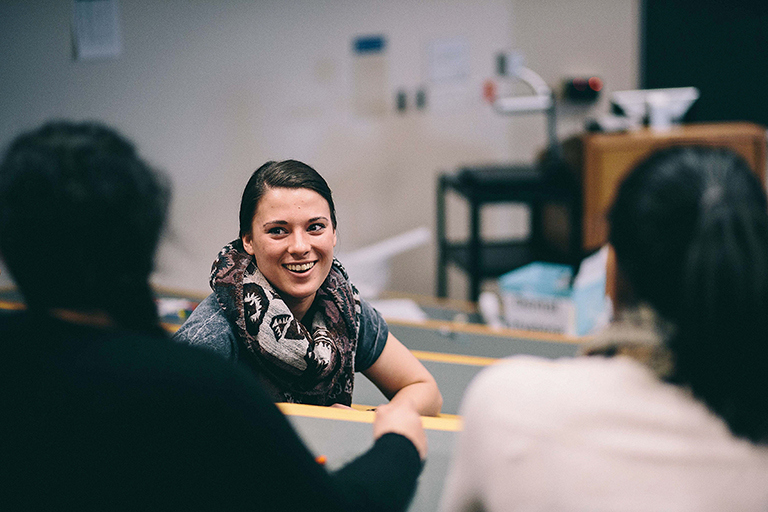Speak Up, Stand Out
When asked the why she and many hundreds of other busy, hard-studying students choose to become ‘student leaders’ at UBC, Hannah Barath pauses in thought. As a fourth-year major in Cognitive Sciences at UBC Vancouver, Barath considers the question carefully, then shrugs and smiles.
“Why? It sounds a little bit cheesy but ‘ to help create a better world’.”
The smile becomes a laugh. “Pretty cheesy, huh?”
Maybe but when surveyed, student leaders cite the desire to ‘give back and contribute to community’ as the number-one reason to become a student leader on campus.
As a globally recognized university with a widely diverse population nearing 60,000 students and 16,000 faculty and staff on both campuses, UBC mirrors the world and as a result, is uniquely positioned, as an educational institution, to help students, and all members of its community, to learn and engage in critical analysis that enables them to identify, address and respond to the systemic nature of oppression.
In 2013/14 and in response to the recommendations put forward by the President’s Task Force on Gender-based Violence and Aboriginal Stereotypes, the Vice-President’s Students Office developed and launched an enhanced training program for 1,200 student leaders to build their capacity to foster more respectful and inclusive communities at UBC. The training provided students with proactive tools and methods to help recognize the effects of discrimination, hate, prejudice and stereotyping and develop strategies to address it in the moment.
This spring, another 1,500 student leaders have participated in a revised version of this training. Later this summer, an online orientation module will be made available to all incoming students before they arrive on campus and which underlines the importance of respect for place, meaningful connections and individual responsibility in achieving these goals.
UBC Access and Diversity Director Janet Mee says: “Our hope is that if we engage first-year students before they even arrive on campus in a conversation about the ambitions of the community they’re joining and their role and responsibilities as a community member, and we stay consistent in that messaging over four to five years, we have the potential to change our own culture and own campus climate.”
It’s here where the student leaders shine.
For example, each year during UBC’s Imagine Day, more than 1,200 student orientation leaders welcome 7,000 or more first-year students to their first day on campus. For many students, orientation leaders are one of their first peer-to-peer interactions at UBC. The leadership they provide is a critical factor in the success of first-year experience programming.
Coordinated through the Vice-President Students’ Office, this peer-support isn’t a one-off; throughout the year student leaders, staff and faculty work together to ensure that every new student feels safe, supported and welcomed.
It takes courage to recognize an act of discrimination and respond to it, and even more when the comment or action comes from within one’s own social group.
“This is where the enhanced training comes in,” explains Mee. “It’s designed to give students the tools, ability and confidence to intervene with respect, calmly engage in a conversation, and to have a positive impact on the actions of others.”
“I think it gives you more comprehensive skills,” says Barath. “Actual things you can do. It doesn’t just tell you: ‘You should be an inclusive, caring person’. It shows you how.” The training includes different scenarios students might come across in their own leadership experience to better prepare them to use their new skills to speak up. “If you happen to be in a situation that takes you by surprise, and you are unprepared,” explains Barath “it’s too easy to just stay quiet and say nothing.”
Which isn’t good: silence communicates consent and agreement.
Every member of our community has a role to play in creating a respectful and inclusive community,” says Mee. “It’s about working consciously to create a community in which every member is respected, included, and welcomed and has the opportunity to thrive.”
Barath believes it’s all coming at a good time:
“Students on campus are becoming more aware of the impact of the language they are using and are more committed than ever to creating inclusive and respectful communities across difference. They want this change to happen.”
Cheesy? No. Quietly courageous, yes.
Read more about
Intercultural UnderstandingRead more Intercultural Understanding stories:
This story also illustrates our commitment to:
Student LearningRelated Content


Campus
Vancouver
As an educational institution, UBC has a special opportunity to help students, and all members of its community, to learn and engage in critical analysis that enables them to identify, address and respond to the systemic nature of oppression that surrounds us all.